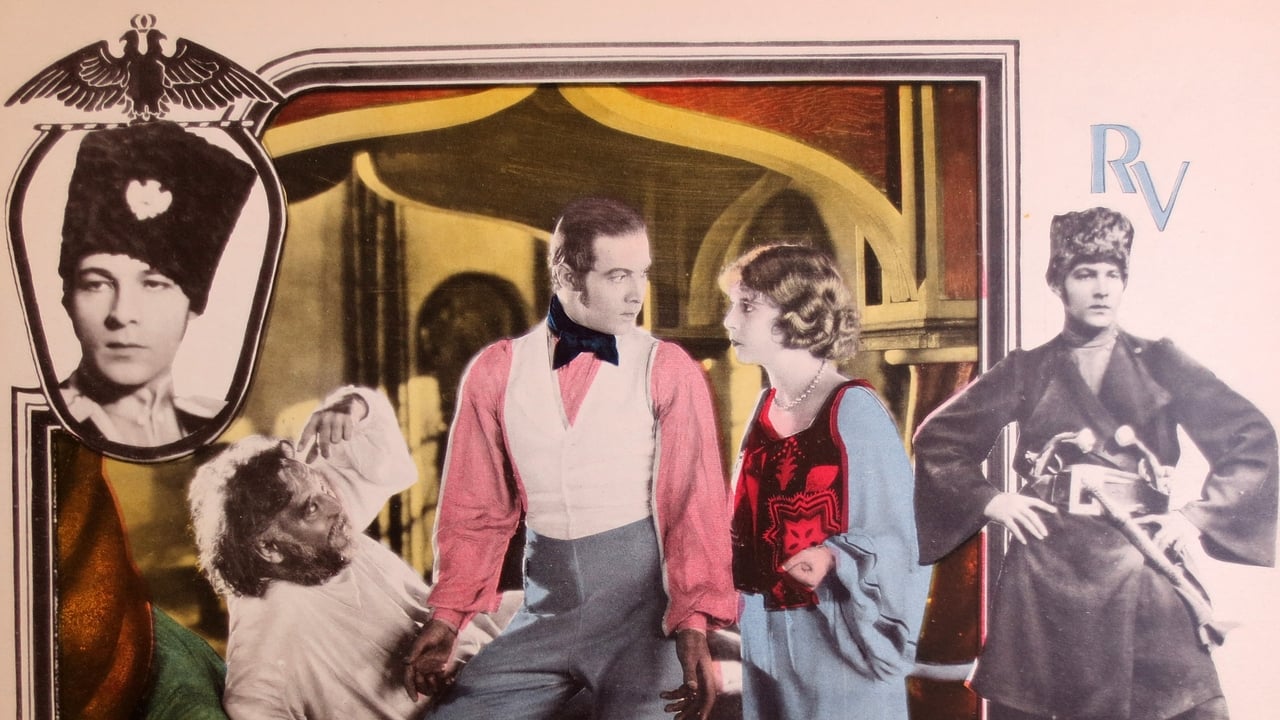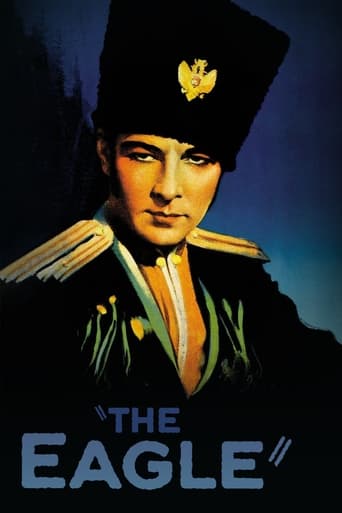

ridiculous rating
... View MoreIf the ambition is to provide two hours of instantly forgettable, popcorn-munching escapism, it succeeds.
... View MoreIt isn't all that great, actually. Really cheesy and very predicable of how certain scenes are gonna turn play out. However, I guess that's the charm of it all, because I would consider this one of my guilty pleasures.
... View MoreA terrific literary drama and character piece that shows how the process of creating art can be seen differently by those doing it and those looking at it from the outside.
... View MoreA wanted Russian lieutenant becomes a masked vigilante seeking vengeance upon the man who stole his family's land, only to fall for his charming daughter.The character of Black Eagle, interestingly enough, does not exist in the original Pushkin novel and was inspired by the performance of Douglas Fairbanks as Zorro in "The Mark of Zorro". ("The Eagle" is also notable in cinematic history for its famous extended tracking shot of the food-laden table in the banquet scene.) This is the sort of film that made Valentino famous, because who doesn't want to see him as a sort of swash-buckling hero? Heck, he buckles the swash with the best of them.
... View MoreRussian lieutenant Vladimir Dubrovsky (Rudolph Valentino) vows vengeance against a man named Kyrilla (James A. Marcus) after Kyrilla used treachery to steal Dubrovsky land, which left his father a dying, ruined man. Eventually hiding his face under a mask and assuming the identity "The Black Eagle", he and his band of followers set out to bring down Kyrilla. However Dubrovsky has even more reason to hide his face because having offended the Czarina of Russia by spurning her affections, she has issued a warrant for his arrest dead or alive for desertion from his regiment. Further complicating Dubrovsky's plans is he unexpectedly winds up falling in love with Kyrilla's daughter Mascha (Vilma Bánky).Well it's certainly unpredictable, you have to say that. This one certainly has plenty of twists and turns to keep you guessing what might befall our hero next. Valentino it cannot be denied is excellent in the lead role as an heroic bandit with irresistible charm. This does deliver romance and some tense moments for our ill-fated lovers. The problem here is that really "The Black Eagle" never quite seems to deliver the goods when it comes to action, his most impressive moments firing a shot at a key moment and as expected coming to the rescue of his damsel in distress time and time again. Also the ending doesn't quite seem to ring true given previously established events in our story. Still certainly not bad of its type, just a straightforward romantic adventure, almost fairytale-like, in a fashion.
... View MoreI seldom see this title mentioned on lists of great silent films, and perhaps it doesn't belong in the same heady company with the works of Murnau and Eisenstein, but surely The Eagle belongs on anyone's list of the most entertaining movies made during the silent era. It is first-rate escapism, a real "movie-movie" that can hold its own with the best swashbuckling sagas of Douglas Fairbanks and Errol Flynn, and that counts for a lot in my book. It's also one of the best movies in which Rudolph Valentino appeared (along with his next film, The Son of the Sheik, which unfortunately proved to be his last), or in any case it's one that holds up well for modern viewers, offering just the right blend of action, suspense, comedy, and romance, all presented at a brisk tempo. Valentino rapidly improved as an actor during his brief career, so in these final appearances there is no trace of the nostril-flaring histrionics on display in some of his early performances. At the pinnacle of his career as a movie star, Valentino is at the top of his game in this action hero role, charismatic and self-assured, but displaying just a touch of self-mockery to keep things in perspective.Rudy plays a Cossack officer, Lieutenant Dubrovsky, stationed in the court of Catherine the Great. (The Czarina is played by Louise Dresser in a brief but memorable turn.) Dubrovsky catches the Czarina's eye when he manages to regain control of a runaway carriage just outside the palace gates, and in this way he also meets a beautiful young lady named Mascha (Vilma Banky), with whom he becomes involved. The plot kicks into gear when Dubrovsky rejects the Czarina's advances; soon afterward, he assumes the persona of the Black Eagle, an outlaw devoted to avenging his father, whose lands have been appropriated by an evil count named Kyrilla -- who just happens to be Mascha's father. Valentino's character in this film is often described as a "Russian Robin Hood," but the parallel with Zorro is stronger, especially when he manages to operate under the very nose of his arch enemy in the guise of a foppish French tutor, Monsieur Le Blanc. Much of the film's humor comes from these scenes, but when the time comes for action The Black Eagle is all business, and Valentino proves himself as dashing and gallant as Douglas Fairbanks while cutting a more romantic figure.The Eagle points up the importance of silence in Valentino's career, for while he was said to have a pleasant voice it might have been difficult to accept him as a Russian officer in a talkie; let's face it, Rodolfo Alfonzo Raffaele Pierre Filibert Guglielmi di Valentino d'Antonguolla would have a hard time persuading anyone of his Russian heritage if we could hear him speak. Leading lady Vilma Banky, who was as beautiful as Rudy was handsome, spoke limited English with such a thick Hungarian accent that talkies ended her American film career, so this movie could not have worked so well with the same cast as a talkie, even if Valentino had survived into the 1930s. And besides, the highly stylized 19th century "Russia" of this film is very much a Hollywood fantasy concoction anyhow, the sort of thing that worked best in silent cinema. One of my favorite aspects of The Eagle is the elaborate Art Deco design scheme by William Cameron Menzies, which at times almost suggests the world of Dr. Seuss (a bit of an exaggeration, perhaps, but not by much). Combine Menzies' sets with the stylish cinematography of George Barnes, spice the mix with George Marion Jr.'s witty title cards, top it off with the slyly tongue-in-cheek performances, and you have all the ingredients for a cinematic feast.In sum, I feel it's the comic elements of The Eagle that make it such a fun film, the sense that the filmmakers are discreetly giving us a little wink to let us know they're well aware this is all cotton candy. Speaking of comedy, the cast features a couple of Keystone veterans in supporting roles: Mack Swain, who was so memorable as the delusional prospector in Chaplin's The Gold Rush, has a brief uncredited bit as an inn-keeper who misunderstands Monsieur Le Blanc's needs; and veteran character actor George Nichols, who plays the corrupt judge, directed a few of Chaplin's earliest comedies, including The Star Boarder and Cruel, Cruel Love. Maybe it's the Keystone pedigree that boosts the comedy content here, but whatever the case this film stands as a highly enjoyable example of what Hollywood craftsmen were capable of when the silent cinema was at its peak.
... View MoreI really enjoyed watching this film after a gap of 15 years or so. The version I saw before was the Photoplay version, restored for UK Channel 4 and video release in 1986, this time it was an InstantVision DVD I picked up for £1 in 2004. It sure ain't got Carl Davis's score! The music is OK and it accidentally works for much of the film, but it repeats in 13 minute cycles come what may in the 72 on the screen. The fact that it is so apparent is the only annoying thing about the DVD production, and only detracts slightly from the film itself - you can play it silent!It's a tale similar to Zorro in sex-mad Catherine the Great's Russia/ Hollywood, with the Vengeance of the Black Eagle ultimately diffused by Love. The camera treats Valentino and Banky well, two young and beautiful people caught in time for all time. Good points: The scene with the banquet table groaning (under the camera apparatus?); Valentino massaging Banky's neck in an erotic moment; the splendidly atmospheric marriage in the prison cell. Bad points: Occasional hamminess and the overpowering feeling that we're not in Russia.But all in all a most impressive penultimate film for Valentino, and one I hope to view again with a more sympathetic soundtrack!
... View More